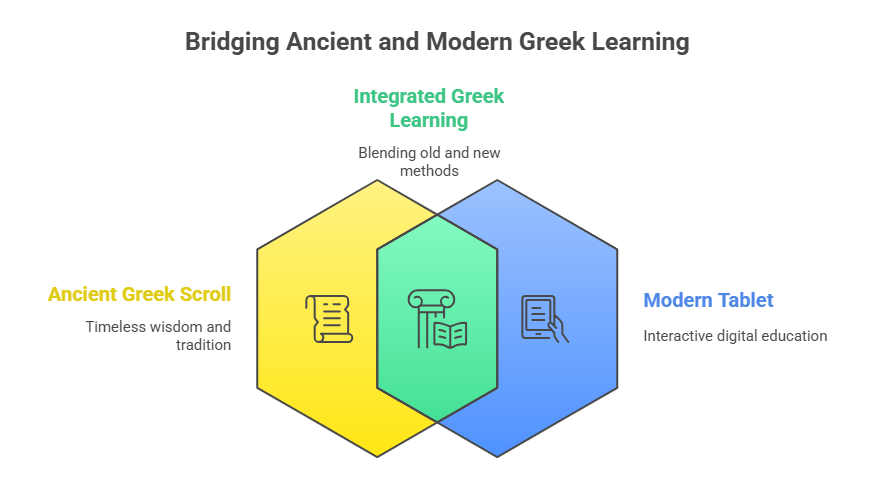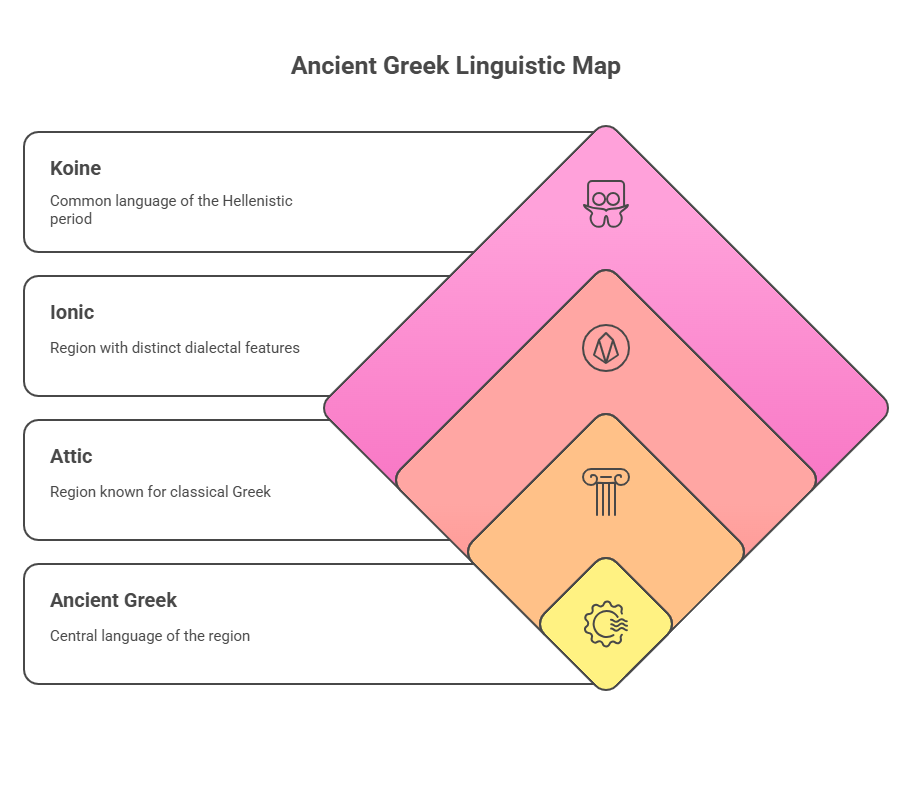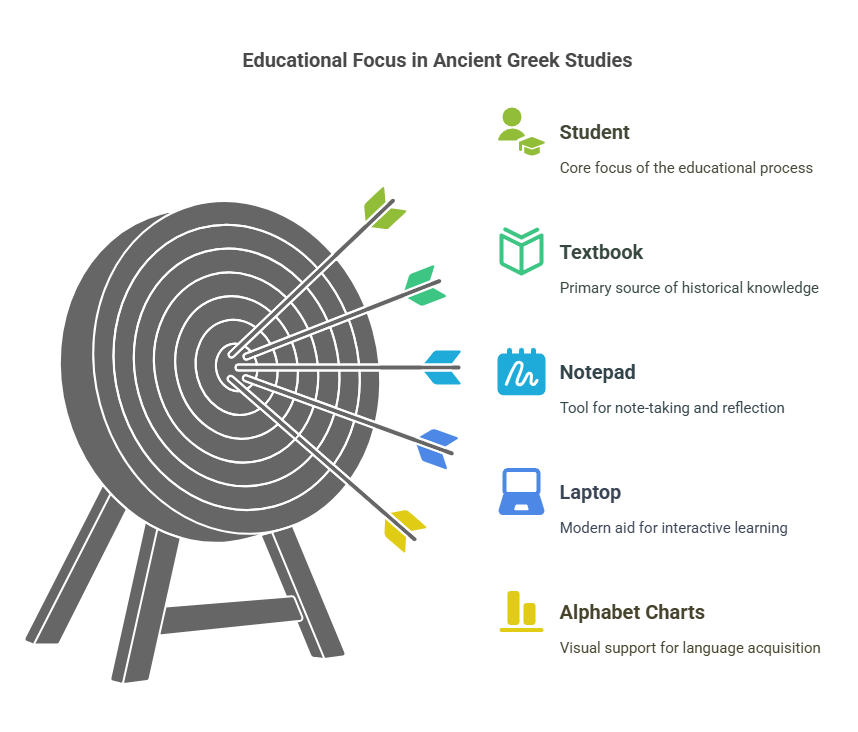Ancient Greek can feel overwhelming to learn—especially if you don’t know where to start. That’s why knowing how to approach this ancient language matters. Many students and lifelong learners struggle with confusing grammar, limited resources, and the fear that it’s “too hard” or “not useful.” But here’s the truth: Ancient Greek opens doors to understanding the roots of philosophy, science, and Western thought.
At LatinPerDiem, I’ve helped thousands of learners worldwide make real progress by using clear, proven methods. In this article, I’ll show you how to learn Ancient Greek step by step—even if you’re just starting out. You’ll get practical tips, helpful resources, and encouragement to succeed.
Key Takeaways
- Ancient Greek still matters — It shapes modern thinking in science, literature, philosophy, and theology.
- It includes several dialects — Attic, Ionic, and Koine each offer unique windows into ancient culture.
- Learning it sharpens the mind — It improves memory, focus, and problem-solving skills.
- Boosts your language skills — Knowing Greek roots helps with English and other languages.
- Gives direct access to classic texts — You can read original works by thinkers like Plato and Aristotle.
- Helps in school and work — It’s useful for careers in history, theology, archaeology, and more.
- You can learn it at your pace — LatinPerDiem offers video lessons and step-by-step courses for all levels.
Why Should You Learn Ancient Greek Today?
Ancient Greek is more than a historic language—it still matters. Learning it helps you understand classic literature, philosophy, and the roots of modern science. It also improves how you think, learn, and communicate. With helpful tools and clear lessons, anyone can start learning Ancient Greek today.
Facts & Original Research: The Real-World Value of Learning Ancient Greek
Learning Ancient Greek isn’t just for academics—real data shows it improves cognitive skills, supports career advancement, and builds strong connections to Western thought. Below is a curated selection of compelling research, statistics, and expert insights that prove its continued relevance.
Cognitive & Educational Benefits
| Insight | Data/Source |
| Better memory and problem-solving | A 2022 study from the Journal of Classical Pedagogy found students who studied Ancient Greek showed 25% higher retention in memory-based tasks compared to those studying modern languages. |
| Improved standardized test scores | According to The College Board, students who study classical languages score 160 points higher on the SAT verbal section on average. |
| Boosts abstract thinking | Research from Harvard’s Center for Hellenic Studies shows Ancient Greek’s complex grammar improves logical reasoning and abstraction, supporting success in math and philosophy. |
Understanding Ancient Greek
Ancient Greek is not a single, uniform language—it’s a rich tapestry of dialects that evolved over centuries. The three most well-known are Attic, Ionic, and Koine.
Attic Greek, spoken in Athens, was the language of great thinkers like Plato and Thucydides. It became the standard for classical literature and philosophy. Ionic Greek, used by writers such as Homer and Herodotus, is known for its poetic rhythm and early historical accounts. Later, Koine Greek emerged as a simplified, more widely used form. It became the common language of the Eastern Mediterranean after Alexander the Great’s conquests and is the dialect used in the New Testament of the Bible.
Each dialect played a vital role in shaping literature, philosophy, religion, and science. Studying their differences offers deeper insight into the way people thought, wrote, and communicated across different regions and time periods.
Learning these variations doesn’t just teach vocabulary—it opens a window into the intellectual and cultural development of the ancient world. It also builds a foundation for reading important texts in their original language, giving learners a more authentic and nuanced understanding of history.
Benefits of Learning Ancient Greek
Enhances Cognitive Skills
Studying Ancient Greek is like a workout for the brain. Its complex grammar, rich vocabulary, and unfamiliar sentence structures push learners to think in new ways. Research shows that learning classical languages improves memory, attention, and problem-solving skills. Decoding Ancient Greek sentences strengthens logical thinking and boosts mental agility, similar to learning advanced mathematics or solving puzzles. It also develops pattern recognition, helping students become better learners in general.
Deepens Understanding of Western Civilization
Ancient Greek is the foundation of Western philosophy, politics, science, and literature. Many core ideas in democracy, ethics, and logic were first written in this language. Learning it allows students to read original texts by Plato, Aristotle, Homer, and Sophocles—without relying on translations. This gives them direct access to the minds that shaped Western thought. Instead of reading someone else’s interpretation, they can explore the text with authentic nuance and depth, gaining a richer understanding of ideas that still shape our world.
Improves Language Proficiency
English—and many other languages—owes much to Greek. Words like biology, philosophy, democracy, and chronology come directly from Ancient Greek roots. By learning Ancient Greek, students uncover the origins of thousands of English words, which improves spelling, comprehension, and confidence in vocabulary use. This foundation also makes it easier to learn other classical or Romance languages, like Latin, French, or Spanish. Understanding Greek roots helps students decode unfamiliar words across disciplines, especially in science, medicine, and law.
Access to Classical Texts
Reading texts in their original Ancient Greek brings a level of authenticity that translations can’t match. Translated works often lose subtle meanings, literary style, or rhetorical techniques. Students who read in the original language discover hidden layers of meaning, uncover wordplay, and develop a deeper appreciation for classical literature and historical documents. Whether it’s a passage from the New Testament or a line of Homeric verse, the experience is more personal and profound when read in the language it was written.
Academic and Career Advantages
Learning Ancient Greek demonstrates discipline, precision, and intellectual curiosity—qualities that stand out in academic and professional environments. In fields like history, theology, archaeology, classics, and linguistics, Ancient Greek is essential for primary research and analysis. Scholars, professors, translators, and museum curators often rely on this skill to engage with source materials. Even outside academia, the ability to study such a challenging subject reflects strong analytical thinking and commitment. This can enhance resumes, graduate school applications, or even teaching careers.
How to Start Learning Ancient Greek
Learning Ancient Greek may seem challenging at first, but with the right tools and guidance, anyone can succeed—whether you’re a complete beginner or looking to deepen your understanding. The key is to begin with a structured, step-by-step approach that builds both confidence and competence.
At LatinPerDiem, we offer resources designed to meet learners at every stage. One of our most popular programs, the Moss Method for Greek, breaks down Ancient Greek into manageable lessons that focus on real reading from the start. Instead of endless memorization, students learn by engaging directly with the language—just like ancient readers did.
Each course includes:
- Daily video lessons that guide learners through vocabulary, grammar, and syntax
- Direct instruction from experienced classicist Dr. David C. Noe
- A flexible, self-paced format that adapts to your schedule
By using real texts and consistent daily practice, students gradually develop the ability to read and understand Ancient Greek independently. The program focuses on long-term retention and helps learners internalize the language rather than just translate it.
For those just starting out, we also recommend:
- Learning the Greek alphabet early—it’s easier than you might think
- Practicing basic grammar and vocabulary regularly
- Listening to and reading Greek aloud to build familiarity
Whether you’re studying for personal enrichment, academic goals, or theological insight, our online courses provide everything you need to start—and keep—learning. Ancient Greek is more accessible than ever, and with LatinPerDiem, you’re never learning alone.
Common Misconceptions About Ancient Greek
“It’s a dead language.” While Ancient Greek isn’t used in everyday conversation, it’s far from dead. Its influence lives on in modern languages, medicine, science, law, and theology. Many academic and professional terms still stem from Greek roots.
“It’s too difficult to learn.” Ancient Greek has complex grammar, but so do many modern languages. With structured lessons and consistent practice—like those offered at LatinPerDiem—it’s entirely possible to achieve fluency in reading and understanding Greek texts.
“It’s irrelevant today.” This couldn’t be further from the truth. The ideas of Plato, Aristotle, Sophocles, and others still shape modern philosophy, politics, ethics, and literature. Learning Ancient Greek connects you directly to the origins of Western thought and enhances your ability to engage with timeless ideas.
By challenging these myths, we can appreciate Ancient Greek as a living legacy—rich with meaning, insight, and continued relevance.
Conclusion
Learning Ancient Greek is more than a scholarly pursuit—it’s a path to understanding the foundations of modern thought. It sharpens the mind, deepens cultural awareness, and provides direct access to timeless works of philosophy, science, and literature. Whether you’re a student, educator, or lifelong learner, exploring Ancient Greek brings lasting intellectual rewards. At LatinPerDiem, we’re dedicated to making this journey approachable and enriching with high-quality, flexible resources for all levels. Start today and connect with the language that shaped the Western world.
Frequently Asked Questions
Is Ancient Greek still useful in today’s world?
Yes. Ancient Greek helps you understand the roots of modern science, politics, medicine, and philosophy. It’s also valuable for students and professionals in fields like linguistics, theology, law, and history, offering direct insight into foundational texts.
How hard is it to learn Ancient Greek for beginners?
While Ancient Greek can be challenging, it’s not impossible. With structured lessons—like those offered at LatinPerDiem—learners can build skills step by step. Many students find that consistency, not difficulty, is the real key to success.
Can I learn Ancient Greek online, even if I’m not a scholar?
Absolutely. With the right tools, anyone can learn Ancient Greek from anywhere in the world. LatinPerDiem offers beginner-friendly video courses like the Moss Method, perfect for learners without any prior background in classical languages.
Why study Ancient Greek instead of modern languages?
Unlike most modern languages, Ancient Greek connects you directly to original sources that shaped Western civilization. While it’s not spoken today, its intellectual, historical, and linguistic value offers lifelong benefits that go beyond conversation.
Where can I study Ancient Greek online with global access?
You can start at LatinPerDiem, which serves students worldwide. Whether you’re in the U.S., Europe, Asia, or Africa, you’ll get access to expert instruction, downloadable resources, and daily lessons tailored for flexible learning.




